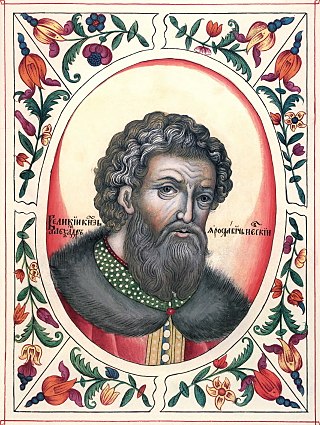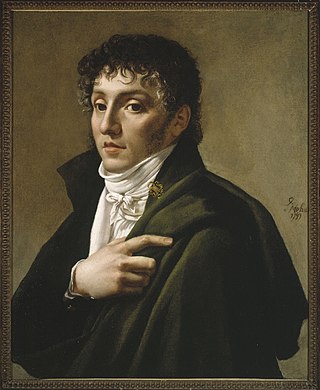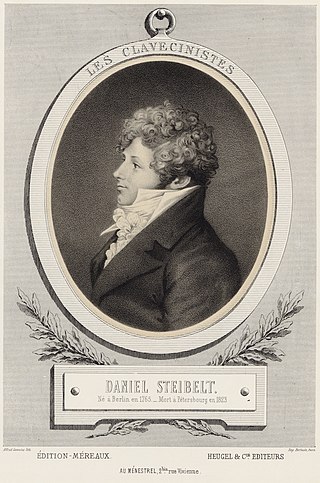Events
| | This section needs expansion. You can help by adding to it. (October 2015) |
- February - Finnish War
- Daniel Steibelt is invited by Tsar Alexander I to Saint Petersburg. [1]
- - Franzfeld
| Years in Russia: | 1805 1806 1807 1808 1809 1810 1811 |
| Centuries: | 18th century · 19th century · 20th century |
| Decades: | 1770s 1780s 1790s 1800s 1810s 1820s 1830s |
| Years: | 1805 1806 1807 1808 1809 1810 1811 |
Events from the year 1808 in Russia
| | This section needs expansion. You can help by adding to it. (October 2015) |
| | This section needs expansion. You can help by adding to it. (October 2015) |
| | This section needs expansion. You can help by adding to it. (October 2015) |

1808 (MDCCCVIII) was a leap year starting on Friday of the Gregorian calendar and a leap year starting on Wednesday of the Julian calendar, the 1808th year of the Common Era (CE) and Anno Domini (AD) designations, the 808th year of the 2nd millennium, the 8th year of the 19th century, and the 9th year of the 1800s decade. As of the start of 1808, the Gregorian calendar was 12 days ahead of the Julian calendar, which remained in localized use until 1923.

The Napoleonic Wars (1803–1815) were a series of conflicts fought between the First French Empire under Napoleon (1804–1815) and a fluctuating array of European coalitions. The wars originated in political forces arising from the French Revolution (1789–1799) and from the French Revolutionary Wars (1792–1802), and produced a period of French domination over Continental Europe. The wars are categorised as seven conflicts, five named after the coalitions that fought Napoleon, plus two named for their respective theatres; the War of the Third Coalition, War of the Fourth Coalition, War of the Fifth Coalition, War of the Sixth Coalition, War of the Seventh Coalition, the Peninsular War, and the French invasion of Russia.

Prince Pyotr Ivanovich Bagration was a Russian general and prince of Georgian origin, prominent during the French Revolutionary and Napoleonic Wars.

Alexander Yaroslavich Nevsky was Prince of Novgorod, Grand Prince of Kiev (1246–1263) and Grand Prince of Vladimir (1252–1263).

The Napoleonic era is a period in the history of France and Europe. It is generally classified as including the fourth and final stage of the French Revolution, the first being the National Assembly, the second being the Legislative Assembly, and the third being the Directory. The Napoleonic era begins roughly with Napoleon Bonaparte's coup d'état, overthrowing the Directory, establishing the French Consulate, and ends during the Hundred Days and his defeat at the Battle of Waterloo. The Congress of Vienna soon set out to restore Europe to pre-French Revolution days. Napoleon brought political stability to a land torn by revolution and war. He made peace with the Roman Catholic Church and reversed the most radical religious policies of the Convention. In 1804 Napoleon promulgated the Civil Code, a revised body of civil law, which also helped stabilize French society. The Civil Code affirmed the political and legal equality of all adult men and established a merit-based society in which individuals advanced in education and employment because of talent rather than birth or social standing. The Civil Code confirmed many of the moderate revolutionary policies of the National Assembly but retracted measures passed by the more radical Convention. The code restored patriarchal authority in the family, for example, by making women and children subservient to male heads of households.

The Finnish War was fought between the Kingdom of Sweden and the Russian Empire from 21 February 1808 to 17 September 1809 as part of the Napoleonic Wars. As a result of the war, the eastern third of Sweden was established as the autonomous Grand Duchy of Finland, a state under the rule of the Russian Empire. Other notable effects were the Swedish parliament's adoption of a new constitution and the establishment of the House of Bernadotte, the new Swedish royal house, in 1818.

Étienne Nicolas Méhul was a French composer of the late classical and early romantic periods. He was known as "the most important opera composer in France during the Revolution". He was also the first composer to be called a "Romantic". He is known particularly for his operas, written in keeping with the reforms introduced by Christoph Willibald Gluck and Wolfgang Amadeus Mozart.

Armand-Augustin-Louis de Caulaincourt, duc de Vicence, was a French military officer, diplomat and close advisor to Napoleon I.

The Treaties of Tilsit, also collectively known as the Peace of Tilsit, were two peace treaties signed by French Emperor Napoleon in the town of Tilsit in July 1807 in the aftermath of his victory at Friedland, at the end of the War of the Fourth Coalition. The first was signed on 7 July, between Napoleon and Russian Emperor Alexander I, when they met on a raft in the middle of the Neman river. The second was signed with Prussia on 9 July. The treaties were made at the expense of King Frederick William III of Prussia, who had already agreed to a truce on 25 June after the Grande Armée had captured Berlin and pursued him to the easternmost frontier of his realm.

The Grand Duchy of Finland, officially and also translated as the Grand Principality of Finland, was the predecessor state of modern Finland. It existed between 1809 and 1917 as an autonomous state ruled by the Russian Empire.

Count Alexei (Alexey) Grigoryevich Orlov-Chesmensky was a Russian soldier, general-in-chief, general admiral and statesman, who rose to prominence during the reign of Catherine the Great. His joint victory with Grigory Spiridov and Samuel Greig in the Battle of Chesma put him in the ranks of the outstanding Russian military commanders of all time; and although he lacked naval experience, he was the only authority in those circumstances who could ensure proper co-ordination of action.

The Russian-American Company Under the High Patronage of His Imperial Majesty was a state-sponsored chartered company formed largely on the basis of the United American Company. Emperor Paul I of Russia chartered the company in the Ukase of 1799. It had the mission of establishing new settlements in Russian America, conducting trade with natives, and carrying out an expanded colonization program.

During the Napoleonic Wars, the Anglo-Russian War was the phase of hostilities between Great Britain and Russia after the latter signed the Treaty of Tilsit that ended its war with France. Anglo-Russian hostilities were limited primarily to minor naval actions in the Baltic Sea and Barents Sea.

Count Alexey Andreyevich Arakcheyev or Arakcheev was an Imperial Russian general and statesman during the reign of Tsar Alexander I.

Daniel Gottlieb Steibelt was a German pianist and composer. His main works were composed in Paris and in London, and he died in Saint Petersburg, Russia.

Vyborg Governorate was an administrative-territorial unit (guberniya) of the Russian Empire. It was established in 1744 in newly ceded territories from Sweden following the Treaty of Åbo and parts of Saint Petersburg Governorate which were previously ceded by Sweden in 1721 as a result of the Great Northern War.

Friedrich Wilhelm Graf von Buxhoevden was a Russian general of the infantry and government official. Buxhoeveden commanded the Russian armies during the Finnish War.

Ministry of War of the Russian Empire, was an administrative body in the Russian Empire from 1802 to 1917.

Alexander I, nicknamed "the Blessed", was Emperor of Russia from 1801, the first king of Congress Poland from 1815, and the grand duke of Finland from 1809 to his death in 1825. He was the eldest son of Emperor Paul I and Sophie Dorothea of Württemberg.
Sophia Hewitt Ostinelli (1799-1845) was an American classical musician who was a child prodigy who later became the only woman ever employed as an organist and accompanist by the Handel and Haydn Society in Boston, Massachusetts. She also became the second musician ever to perform the music of Beethoven in Boston.
![]() Media related to 1808 in Russia at Wikimedia Commons
Media related to 1808 in Russia at Wikimedia Commons